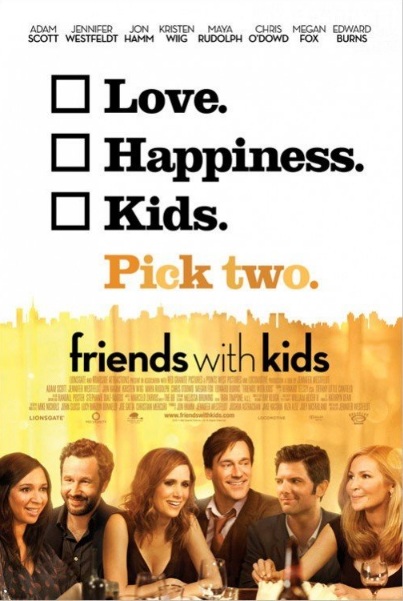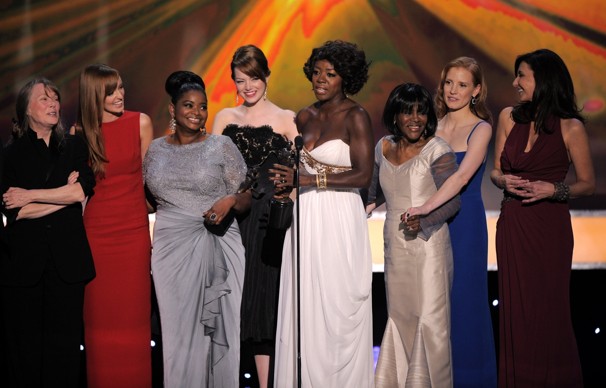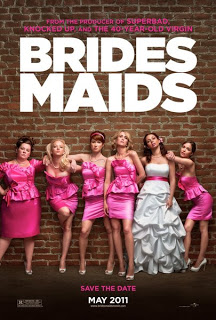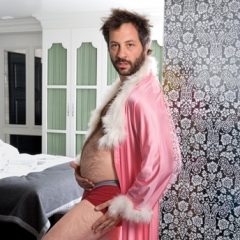I’ve been excited to see Friends with Kids since last year when I heard it would reunite Bridesmaids castmates Kristen Wiig (omg do I love, love, LOVE her in Bridesmaids and on SNL!), Maya Rudolph (adore her in Away We Go and Up All Night), Chris O’Dowd (adorbs in Bridesmaids) and Jon Hamm (of course I swoon for Don Draper). When I discovered a woman wrote AND directed it, Jennifer Westfeldt in her directorial debut, my elation skyrocketed! No joke.
Written, directed, produced and starring actor Jennifer Westfeldt, Friends with Kids tells the story of two best friends Julie (Westfeldt) and Jason (Adam Scott), who decide to have a baby together while remaining platonic friends “so they can avoid the toll kids can take on romantic relationships.” It looks like a hilarious, awkward yet sweet ensemble comedy about friends navigating friendships, relationships and parenting.
A Tony and Indie Spirit Award nominated actor, Westfeldt is probably best known for her role as actor, co-writer and co-producer of the critically-acclaimed lesbian romantic comedy Kissing Jessica Stein. She also wrote and starred in Ira and Abby, a story of two strangers who get married. In an interview with Marie Claire, Westfeldt shared her inspiration for Friends with Kids, which stemmed from being out of sync with where your friends are in life:
“Four years ago, Jon’s and my friends started having babies, and everything became so kid-centric. You miss one-on-one time with your friend. When you’re childless and close friends become new parents, you suddenly feel left out, and that’s where the kernel of this idea came from.”
Being single doesn’t sound a death knell. Yet Hollywood would have you believe otherwise, especially if you’re a woman. The media also often shows only the glamorous, fairy-tale side of weddings, babies and relationships. I’m hoping Friends with Kids will tell a more authentic story. Too many people wait for their life to start, thinking events must progress in a certain order: college, career, marriage, home, baby. But why can’t you do things differently? Who’s to say you can’t have a baby without a relationship? Each of the 3 films Westfeldt has written share a theme of taking relationships and life choices and “turning the norm on its head,” choosing a different path than what convention dictates.
Earlier today, Melissa Silverstein wrote about the “depressing reality of women directed film in 2012” and how we need to generate more anticipation and buzz for upcoming films directed by women. With female writers comprising 24% of all writers in Hollywood, 17% in film and only 5% of women as directors, down from 7% in 2010 and 2009 (god that’s horrifying depressing and makes me cringe), it’s exciting to see a film written and directed by a woman that could potentially do well with both female and male audiences.
Now, I’m not saying films written, directed or starring women are automatically good. Some suck (although I always hate saying that since there aren’t nearly enough movies created by women). And I don’t know if Friends with Kids will be amazeballs, a feminist extravaganza! But I’m optimistically hopeful considering it co-stars two talented and hilarious female comedians (Rudolph and Wiig) and Westfeldt, the woman behind and in front of the camera, not only writes interesting female characters but also speaks openly that “there aren’t that many interesting roles for women in TV and film.”
We need to support women filmmakers if we ever hope for Hollywood to become more gender equitable. When Bridesmaids came out, Salon writer Rebecca Traister argued it was people’s “social responsibility” to go see it:
“Yes we can … buy tickets to a Kristen Wiig movie in an effort to persuade Hollywood that multidimensional women exist, spend money and deserve to be represented on film…we now inhabit an entertainment universe in which everything male-centered is standard, and everything female-centered is female…What that means in practical terms is that women will plonk down dollars to see a male-dominated action movie, a girl-gobbling horror flick, or a dude-centric comedy just as easily as they’ll pay for the kind of female-fueled movie that is literally made for them. Men, meanwhile, have apparently been so conditioned to find anything female emasculating (notwithstanding the expectation that their girlfriends find anything male, including “Thor,” scintillating) that they cannot be moved to sit through any movie with a fully developed woman at its center.”
Westfeldt wasn’t initially going to direct but she stepped into the role of director in order to remain on the tight filming schedule. But that doesn’t mean Westfeldt doesn’t recognize the importance and power of female filmmakers:
“It’s really been a year of sisters doing it for themselves. At Sundance there were, like, five movies where women were writing roles for themselves. And the success of women like Lena Dunham and Miranda July and Tina Fey and now Kristen [Wiig], among others; it’s a pretty cool time to see how much has evolved in that regard…I’m happy to be part of that wave, and I’m inspired by how much of that is going on. It feels like there’s a wave happening of women taking a little more control of their own creative fates.”








